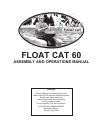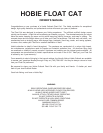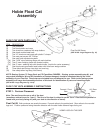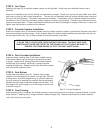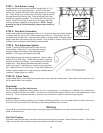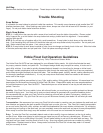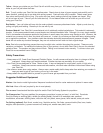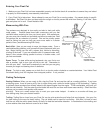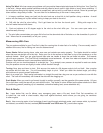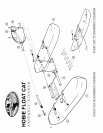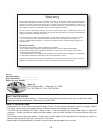
Trouble Shooting
Snap Button
It is possible for snap buttons to get stuck inside the crossbars. This usually occurs because a tool smaller than 3/8"
diameter has been used. When pushing snap button down, always use a tool with at least a 3/8" diameter (or your
finger). Do not push button below aluminum surface.
Stuck Snap Button
STEP 1- A swift hit on the cross bar with a screw driver handle will snap the button into position. Place a pocket
knife, fingernail file, or a thin blade in the snap button hole and pry button back into alignment. If unsuccessful,
continue with step #2.
STEP 2- Pry off end cap of crossbar with a thin, small screwdriver. If snap button is stuck down on the outer side of
hole. Find something fairly stiff that will fit inside the tube and push snap button slowly into position. Do not push past
hold. Button should snap into place. If not, return to step #1.
STEP 3- If snap button is stuck down innerside of hole, use a wire hanger and bend a hook in the end. Slide into inside
of the tube past snap button and pull past hole. Push into place according to step #2.
Hobie Float Cat Operation Guidelines
Written by Larry Tullis, Professional Outdoor Writer
The Hobie Float Cat 60/75 has been designed for your stillwater fishing needs. It’s rigid hulls eliminate the need
for pumps, pressure checks, and patch kits. The compact design allows easy transport on cartop, in trucks and in
sport-utility vehicles. It can also be quickly disassembled and stowed in our travel bag for storage or airline travel.
The tough, molded polyethylene hulls are designed to slide through the water easily (with fins or oars as propulsion)
and to keep the angler elevated just above the water. This increases speed, visibility, warmth, casting clearance and
fin clearance (weedbeds, shallows etc.). It’s not just a step above float tubes, Hobie has created a new class of
water craft for the angler.
These operation guidlines were written by Larry Tullis, angling author, fishing guide and lecturer. His experience has
been tapped for the benefit and learning of Hobie Float Cat users. Please follow safety and use recommendations
for best performance of your Float Cat 60/75. These techniques can all be learned in one day but will take time to
perfect. Have fun.
Stability: Your Float Cat is very stable, but as with all small boats, you must have your weight centered and always
be aware of tipping over. Your boat can tip and you should always be prepared with a personal floatation device.
We recommend that you take your Float Cat into a swimming pool and learn all about it’s buoyancy, stability and
general characteristics. Flip your Float Cat over so you will be aware of exactly how stable it is and what you need
to be prepared for.
Transportation: We recommend you carry your Float Cat to the water by reaching your arm between the seat back and
bow crossbar and grasping the stern crossbar, lifting the boat up under your arm. Your Float Cat is easily transportable
on car roof racks, bike racks, utility vehicles, and also fits disassembled into most midsize vehicle trunks. By unclipping
the seat strap and pulling on the seat back, you can completely remove the seat back and apron for easy transportation.
When ready to use the boat simply snap the seatback on to the cross bar and reconnect the seat straps.
Entry: To enter the Float Cat, completely detach mesh at velcro and flip ring over backrest so the ring is resting
on tips of bow. Make sure zippers on apron bags are closed so you will not lose any valuable gear. Sit down on
seat and put your fins on while sitting in the boat, This will make walking in and out of the water safe and easy. Flip
ring back over your head, bunching mesh to front of ring. Snap ring support posts onto rear crossbar by pushing
straight down. Reattach mesh to velcro. Always enter and launch the Float Cat in knee deep water in a manner
that you can easily sit down.
7
Hull Bag
Remove male buckles from webbing straps. Thread straps under both crossbars. Replace buckle and adjust length.



